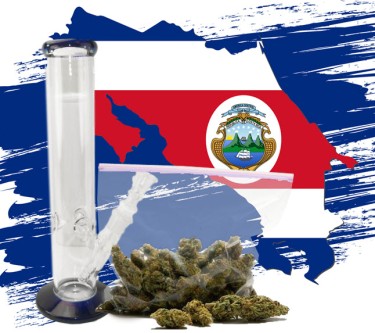Cannabis News
No Recreational Cannabis in Costa Rica
Published
4 months agoon
By
admin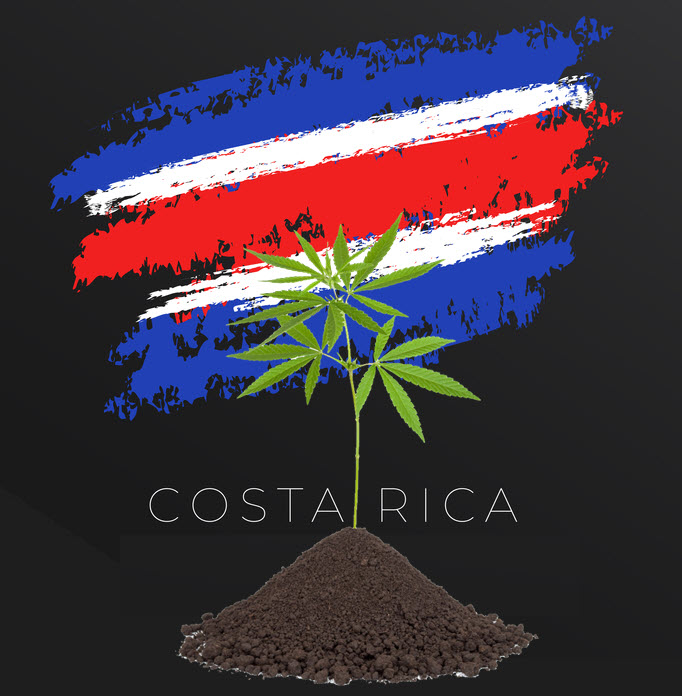
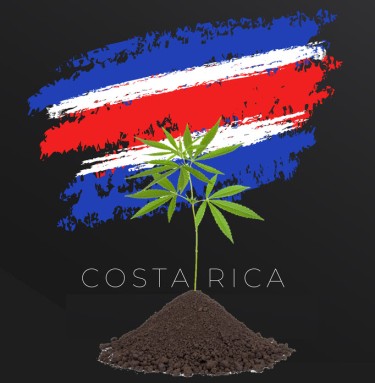
On November 28, 2024, the Costa Rican Constitutional Court, known as Sala IV, made a landmark ruling that has sent shockwaves through the nation and the broader Latin American region: it struck down a proposed referendum aimed at legalizing recreational cannabis. This decision not only halts the immediate efforts to bring recreational cannabis to the ballot but also raises critical questions about the future of cannabis legislation in a country that has seen significant strides in medical marijuana and hemp legislation. This article explores the implications of this ruling, the broader context of cannabis laws in Costa Rica, and what this means for future legislative efforts.
The Constitutional Court’s Ruling
Legal Basis for the Decision
The ruling by Sala IV was grounded in constitutional law and international obligations. The court found that the proposed referendum, which sought to allow Costa Ricans to vote on legalizing recreational cannabis, was unconstitutional based on Article 7 of Costa Rica’s Political Constitution. This article emphasizes that international treaties ratified by Costa Rica take precedence over domestic laws.
The court specifically cited conflicts with several key international agreements:
1. 1961 Single Convention on Narcotic Drugs: This treaty classifies cannabis as a controlled substance and restricts its use to medical and scientific purposes.
2. 1988 UN Convention Against Illicit Traffic in Narcotic Drugs: This agreement reinforces prohibitions against recreational use of drugs, including cannabis.
3. Vienna Convention on Psychotropic Substances: Like the previous treaties, this convention emphasizes restrictions on drug use and trafficking.
The court concluded that any attempt to legalize recreational cannabis through a referendum would violate these international obligations, thus rendering such a measure unconstitutional.
Background of the Proposed Referendum
The initiative for the referendum was led by Erick González Camacho, who sought to gather enough signatures to bring the issue before voters nationwide. The proposal aimed not only to legalize recreational cannabis but also to regulate its production and sale, similar to frameworks established in other countries that have embraced legalization.
The Supreme Electoral Tribunal (TSE) had initially referred González’s request for a referendum to the Constitutional Chamber for review. However, the court’s decision effectively blocks any progress of the bill through both the referendum mechanism and legislative approval without addressing these international conflicts.
The Broader Context of Cannabis Legislation in Costa Rica
While recreational cannabis remains illegal, Costa Rica has made significant strides in legalizing medical marijuana. In 2022, after extensive debate and advocacy from various sectors of society, Costa Rica legalized medical cannabis. This landmark decision allowed patients suffering from various ailments—including chronic pain, epilepsy, and cancer—to access therapeutic products derived from cannabis.
The legalization of medical marijuana marked a significant shift in public policy and social attitudes toward cannabis. It aligned Costa Rica with other Latin American countries that have recognized the medicinal benefits of cannabis while also providing a framework for regulation and oversight.
Moreover, Costa Rica has embraced industrial hemp cultivation as part of its agricultural strategy. The Ministry of Agriculture and Livestock (MAG) has issued numerous licenses for hemp production, signaling a growing acceptance of cannabis-related industries within regulated frameworks. Hemp is seen as a versatile crop with applications ranging from textiles to construction materials.
President Rodrigo Chaves’ Stance
President Rodrigo Chaves has been an outspoken advocate for legalizing recreational cannabis as part of his broader strategy to combat crime and generate tax revenue. Chaves argues that regulating cannabis could provide safe access for consumers while cutting off profits to criminal networks that thrive on illegal drug trade.
In his administration’s view, legalization could also yield significant economic benefits:
-
Tax Revenue: Legalizing recreational cannabis could generate substantial tax revenue that could be reinvested into public services such as healthcare and education.
-
Job Creation: A regulated cannabis market could create jobs across various sectors—from cultivation and retail to distribution and marketing.
-
Tourism: Legalization could attract tourists interested in experiencing a regulated cannabis market similar to those found in countries like Canada and certain U.S. states.
Despite these arguments, public opinion remains divided. Critics express concerns about potential increases in cannabis use among young people and emphasize adherence to international commitments as paramount. The ruling by Sala IV reflects these tensions between progressive policy initiatives and conservative legal frameworks.
Implications of the Court’s Decision
The court’s ruling signifies a substantial setback for advocates seeking to expand cannabis legalization in Costa Rica. It raises critical questions about how future legislation can navigate international obligations while addressing domestic desires for reform. For any new proposals to move forward, they would need to either align with existing treaties or involve a significant shift in Costa Rica’s approach to its international commitments.
In light of this ruling, lawmakers may consider several strategies:
1. Amendment of International Treaties: One potential avenue is advocating for changes at an international level regarding how treaties classify cannabis. However, this is a long-term strategy that would require cooperation from multiple countries.
2. Focus on Medical Cannabis Expansion: Given the court’s acceptance of medical marijuana legislation, advocates may shift their focus toward expanding access to medical products rather than pursuing recreational legalization at this time.
3. Public Education Campaigns: Educating the public about the potential benefits of legalization may help shift public opinion over time, creating an environment more conducive to future legislative efforts.
Public Response and Ongoing Debate
The ruling has reignited discussions around cannabis policy in Costa Rica. Advocates like González remain hopeful for future changes despite this setback; they argue that public sentiment is shifting toward acceptance of recreational use as societal attitudes evolve.
On social media platforms and community forums, citizens are expressing their views—both pro and con—regarding the ruling:
This ongoing debate highlights the complexities surrounding drug policy reform in Costa Rica, a nation known for its progressive social policies yet bound by traditional views on drug use.
The Economic Implications of Cannabis Legislation
While opponents often cite health risks associated with increased drug use as reasons against legalization, proponents highlight several economic benefits:
1. Tax Revenue Generation: Legalizing recreational cannabis could lead to substantial tax revenues that could be allocated toward public services such as education, healthcare, infrastructure development, and drug prevention programs.
2. Job Creation: A regulated market would create numerous jobs across various sectors cultivation, distribution, retail sales and stimulate local economies.
3. Tourism Growth: Countries like Canada have seen increased tourism due to their legalized cannabis markets; Costa Rica could potentially capitalize on this trend by attracting tourists interested in exploring its regulated market.
4. Reduction in Law Enforcement Costs: Legalization may lead to decreased law enforcement costs associated with prosecuting non-violent drug offenses related to possession or use of small amounts of cannabis.
Challenges Facing Economic Arguments
Despite these potential benefits, there are challenges facing advocates who wish to frame legalization as an economic necessity:
-
Concerns Over Public Health: Opponents argue that increased access may lead to higher rates of substance abuse among vulnerable populations.
-
International Obligations: As noted earlier, adherence to international treaties complicates any movement toward legalization; failure to comply could result in diplomatic repercussions or sanctions from other nations or organizations.
The Role of International Treaties
Costa Rica’s obligations under international treaties significantly impact its domestic drug policies:
1. Single Convention on Narcotic Drugs (1961): This treaty aims to combat drug abuse by controlling narcotics through strict regulations; it classifies many substances—including cannabis—as controlled drugs.
2. UN Convention Against Illicit Traffic in Narcotic Drugs (1988): This treaty emphasizes collaboration among nations to combat drug trafficking while reinforcing prohibitions against certain substances’ recreational use.
3. Vienna Convention on Psychotropic Substances (1971): Similar in nature to previous treaties but focuses more specifically on psychotropic substances rather than narcotics alone.
These treaties create a framework within which countries must operate regarding drug policy; thus far, they have largely reinforced prohibitionist approaches globally.
The Need for Reform at an International Level
Advocates for reform argue that existing international treaties are outdated given evolving scientific understandings regarding cannabinoids’ therapeutic properties:
Conclusion
Costa Rica is currently at a pivotal moment in its cannabis legislation following the Constitutional Court’s recent ruling against a proposed referendum for recreational use. This decision highlights the intricate balance between international treaties and domestic reform aspirations, a challenge that many nations face in addressing drug policy. Despite advancements in medical marijuana access and industrial hemp cultivation, the issue of recreational cannabis remains contentious and fraught with legal hurdles. Advocates continue to push for change, fueled by hope that public education campaigns and potential legislative reforms will eventually lead to responsible regulation rather than the historical prohibitionist approaches prevalent in Latin America. Navigating this complex landscape will require lawmakers to engage thoughtfully with constituents, striving to create equitable policies that honor both national interests and international commitments as Costa Rica moves forward into an uncertain yet promising future regarding cannabis use.
COSTA RICA AND CANNABIS, READ ON…
You may like
-


Former New York Knick Iman Shumpert debuts ‘TSA Approved’ legal cannabis brand
-
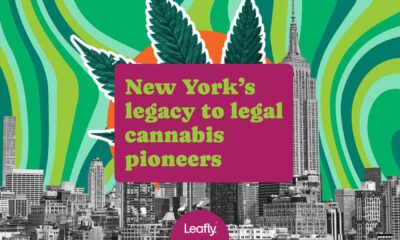

How New York pot pioneers made it to legal dispensary shelves
-


Scientists Now Think That One Compound in the Cannabis Plant Can Replace All Opiates
-
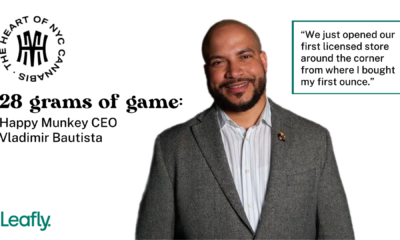

Vladimir Bautista is leading Happy Munkey’s legacy-to-legal takeover
-


Cannabis Can Help A Sore Throat
-
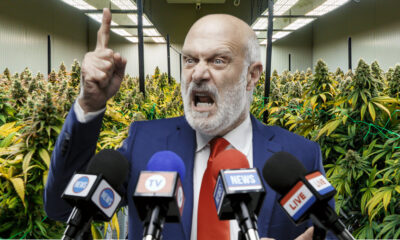

Cannabis and the Authoritarian State
Cannabis News
Scientists Now Think That One Compound in the Cannabis Plant Can Replace All Opiates
Published
5 hours agoon
April 3, 2025By
admin

Which Cannabis Compound Do Scientists Think Can Replace Opiates?
…And Why This Is Important
Opiates are a type of pharmaceutical drug that’s been made from the opium poppy plant. While it’s somewhat a ‘natural’ substance that’s been extracted from the fibers and sap of the opium poppy plant, these are extremely dangerous sedatives that act on the central nervous system. However, there are completely synthetic opioids as well, which are manufactured entirely in laboratories.
Famous examples of well-known and widely-used opiates today include heroin, codeine, and morphine. They all work similarly, binding to the brain’s opioid receptors and users feel a drastic reduction in pain. It also causes users to feel euphoric, drowsy, or sleepy. Common side effects include constipation and nausea.
Because opiates are powerful for dulling one’s pain perceptions, they have become commonly prescribed by doctors and hospitals for pain relief. That said, opiates have become one of the world’s most addictive, dangerous, and fatal drugs – and you can get prescribed it right by your very own physician. Repeated use of opiates can easily lead to dependence and addiction, and eventually consuming high doses can drastically slow down breathing, and cause brain damage, or even death.
Since doctors still keep prescribing opioids, this has resulted in the deadly Opioid Epidemic, which has killed thousands of people. It’s a worrisome public health crisis, most especially because of fentanyl, an illegally manufactured opioid which is said to be 50 times more potent than heroin.
Could The Answer To The Opioid Epidemic Lie In Cannabis…Terpenes?
The past few years have shown that cannabis legalization is critical for surviving the opioid epidemic, and reducing overall opioid consumption.
The results of a recent research paper, which builds on past studies conducted by Dr. John Streicher, who is a member of the Comprehensive Center for Pain and Addiction, reveals fascinating findings. According to Streicher, cannabis terpenes were found to provide relief in inflammation models as well as on neuropathic pain caused by chemotherapy.
For the study, Streicher and his research team analyzed 4 kinds of terpenes that are found in mid to high levels in Cannabis sativa plants: linalool, geraniol, beta-caryophyllene, and alpha-humulene. They discovered that each terpene produced significant pain relief among mice subjects with fibromyalgia and post-operative pain, and among the terpenes, geraniol was found to be the most powerful.
“Our research is showing that terpenes are not a good option for reducing acute pain resulting from an injury, such as stubbing your toe or touching a hot stove; however, we are seeing significant reductions in pain when terpenes are used for chronic or pathological pain,” he said. “This study was the first to investigate the impact of terpenes in preclinical models of fibromyalgia and post-operative pain and expand the scope of potential pain-relieving treatments using terpenes,” Streicher said.
Cannabis terpenes are the compounds responsible for the aromatic profile of each strain; they are located in the plant trichomes. Not only do they contribute to each strain’s unique flavor and odor, but they also have valuable therapeutic and medicinal benefits. There are around 150 kinds of terpenes known today, though in the entire plant world, there are known to be some 20,000 terpenes.
Understanding the therapeutic benefits of terpenes is incredibly valuable also because they don’t contain THC (tetrahydrocannabinol), the compound in marijuana that gets you high.
“With fibromyalgia, there isn’t much of an understanding of what the pain state is, and there are not a lot of great options for treating it,” explains Streicher. “Our findings show that terpenes may be a viable treatment option for fibromyalgia pain, which could potentially have a large impact and make a difference for an under-treated population.”
Other Studies
This is not the first time that cannabis terpenes have been found to demonstrate excellent pain-relieving properties. It must be noted that just like what Streicher says, terpenes seem to do better with chronic pain management, instead of acute pain management.
Another study from 2024, which was published in The Journal of the Association for the Study of Pain, was conducted by researchers at the University of Arizona and the National Institutes of Health. The investigators analyzed the analgesic properties of different terpenes including geraniol, humulene, linalool, pinene, and caryophyllene among mice subjects with chemotherapy-induced peripheral neuropathy.
According to the researchers, all the terpenes delivered analgesic effects that were equivalent to around 10 mg/kg of morphine. It was also interesting to note that administering both morphine and terpenes together at low doses resulted in ‘enhanced’ pain-killing effects.
“Together these studies identify cannabis terpenes as potential therapeutics for chronic neuropathic pain,” said the investigators.
There have also been other studies that have found that combining cannabis with opioids can indeed provide long-lasting pain relief. It comes with the added benefit of reducing opioid doses needed for effective pain control. This phenomenon is called opioid-sparing. These types of protocols can be beneficial for patients who suffer from severe, chronic pain caused by cancer, arthritis, joint problems, fibromyalgia, diabetes, post-surgical pain, migraines, nerve damage, and so much more.
Conclusion
Learning more about the pain-killing properties of terpenes is extremely valuable for the medical community, patients, and even society as a whole. We can all do with less opioid addictions because it has torn families apart, and caused the deaths of thousands of people.
Terpenes, or cannabis in general, offer a natural and safe alternative that can be complementary to other pharmaceutical treatments designed to reduce pain.
SWAPPNG OPIOIDS FOR CANNABIS, READ ON…


Cannabis and the Authoritarian State
Cannabis has been legal for longer than it has been illegal. Let that sink in for a minute. For thousands of years, humans cultivated and consumed cannabis freely across civilizations and continents. It wasn’t until the early 1900s that we witnessed a massive push to drive hemp and cannabis into the black market, primarily due to industrial competition from petrochemicals, pharmaceuticals, and other industrial applications.
What makes cannabis so threatening to powerful interests? For starters, hemp and cannabis are highly versatile crops with over 50,000 different uses, from medicine to textiles to fuel. Even more remarkable is how this plant is hardwired to work with the human body through our endocannabinoid system—a biological network we didn’t even discover until the 1990s.
Perhaps most threatening of all is that cannabis is insanely easy to grow. This means that if the plant helps you with a particular physical ailment, you have the ability to grow your own medicine indefinitely. No insurance premiums, no wait lists, no pharmaceutical middlemen—just you cultivating your own healing directly from the earth.
Authoritarians do not like this, not one bit. When people can meet their own needs independently, power structures lose their grip. When citizens can think differently without permission, control systems begin to fail. So today, we’re going to look at the interesting relationship between authoritarianism and cannabis, and how this humble plant plays a key role in keeping you free.
We’ve already established the versatility of cannabis, but there’s another element that those old D.A.R.E. PSAs inadvertently reveal about what authoritarians think about cannabis. I’m talking, of course, about “behavior.” You see, in an authoritarian system, you and I are but cogs in the machine. We’re the expendables who should be proud to work ourselves to death for our “fearless leaders.”
This is precisely why certain ideas, philosophies, religions, movements, books, and substances are typically banned in authoritarian regimes. Take North Korea as an example: everything from the type of television citizens watch to the music they hear is a tightly spun spell designed to keep the populace in check. While they don’t have explicit laws against hemp (they actually grow it industrially), smoking psychoactive cannabis is strictly forbidden.
Contrast this with places like Malaysia, where you can get up to 5 years for possessing just 20 grams of cannabis, and even face the death penalty depending on the situation. These authoritarians don’t play around when it comes to cannabis because they know it affects the behavior of their populace in ways they can’t control.
The question becomes: what behavior do they fear so much that cannabis produces within the individual?
The answer is a critical mind. People who consume cannabis often begin to question their own belief systems. Most regular users undergo some transformation in their values and perspectives. Cannabis has a unique way of helping people see beyond cultural programming and think outside established paradigms. It can make the familiar strange and the strange familiar—a psychological state that’s antithetical to authoritarian control.
This independent thinking runs counter to the narrative of authoritarians who wish to maintain a tight grip on social consciousness. If even 10% of a population begins to pivot in their behavior within a regime, it can have massive ripple effects. Just look at cannabis in the US—it went from being demonized to being embraced by the majority in less than 80 years, despite massive propaganda efforts.
For authoritarians, psychoactive cannabis isn’t primarily a threat to public health and wellbeing—it’s a threat to the health and wellbeing of authoritarianism itself. When people start thinking differently, they start living differently. When they start living differently, they start demanding different. And that’s the beginning of the end for any system built on unquestioning obedience.
Beyond the threat to thought control, there’s another reason why drugs in general remain illegal: the state can use prohibition as a weapon against the populace. This isn’t conspiracy theory—it’s documented history.
Take Nixon’s war on drugs. His domestic policy chief, John Ehrlichman, later admitted: “We knew we couldn’t make it illegal to be either against the war or black, but by getting the public to associate the hippies with marijuana and blacks with heroin, and then criminalizing both heavily, we could disrupt those communities.” Nixon essentially placed cannabis on the Controlled Substances Act because he needed an excuse to shut down anti-war protests and target Black communities.
Since hippies and anti-war protesters were smoking “freedom grass,” making it illegal would circumvent their freedom of speech and freedom of assembly, and more importantly—turn free citizens into state property. It’s a win-win if you’re an authoritarian looking to silence dissent.
Then there’s the whole “boogeyman” complex that prohibition creates. We’re told “drug dealers” are roaming the streets preying on innocents, giving them “marihuanas” so they can do vile things. What the government conveniently leaves out is how the banks these “dealers” use to launder their money remain untouched. They don’t mention the shadier dealings of law enforcement either—like running guns into Mexico (eventually leading to the death of one of their own), or spraying poison on crops, killing and hospitalizing people because, you know…”Drugs are bad!”
Authoritarians cannot let go of the value that keeping the most widely used illicit substance in the world illegal provides them. This explains why the US hasn’t federally legalized cannabis despite nearly 80% of Americans supporting some form of legalization. It’s not because they don’t have enough research or that they’re genuinely concerned about public health—it’s because prohibition gives them all the privileges of violating constitutional rights while siphoning money into their coffers.
Drug prohibition creates a perpetual enemy that can never be defeated, allowing endless justification for surveillance, militarized police, asset forfeiture, and expansion of state power. What authoritarian could resist such a convenient tool?
Cannabis is a plant. You can’t make nature illegal—it’s counter to the human experience. When governments attempt to criminalize a naturally occurring organism that humans have cultivated and used for thousands of years, they reveal the absurdity of their position and the limits of their authority.
While the United States isn’t a full-on authoritarian state (yet), the truth is that many authoritarian elements have played out over the years. You only need to look as far as the war on drugs to see how the state utilizes prohibition as a weapon to their advantage. From no-knock raids to civil asset forfeiture to mass incarceration, drug laws have erected a parallel legal system where constitutional protections often don’t apply.
The fundamental truth is that cannabis is not only versatile and medicinal, it gives you back your autonomy in multiple ways. It helps you think for yourself. It allows you to grow your own medicine. It connects you with a plant that humans have used ceremonially, medicinally, and industrially throughout our history. And this autonomy is something authoritarians cannot stand—free individuals who know how to think beyond the narratives they’re fed.
Cannabis doesn’t just get you high—it offers a perspective from which the absurdities of prohibition become glaringly obvious. Perhaps this is why, as state after state legalizes, we’re witnessing the slow but steady unraveling of one of the most enduring authoritarian policies in American history.
So if you count yourself among those who value freedom of thought and bodily autonomy, who believe that nature doesn’t require government permission, and who understand that true liberty includes the right to explore your own consciousness—well, maybe it’s time to toke one up for freedom!
LEGALIZING CANNABIS IS NOT ENOUGH, READ ON..
Cannabis News
Stop Using Bat Poop to Fertilize Your Weed Plants Immediately, Here is Why…
Published
2 days agoon
April 1, 2025By
admin

Don’t Fertilize Your Weed with Bat Poop
Fertilization is a critical step for growing healthy marijuana plants.
They help provide essential nutrients for marijuana in various stages of growth, while promoting plant growth. There are dozens of different fertilizers to choose from in the market; growers can choose based on budget, nutrients needed, location, season, and much more. But not all fertilizers are made equally – of course, some are of better quality than others.
That said, there are some rather unusual fertilizers that can be used on plants. These may include, but are not limited to: coffee, milk, grass clippings, banana peels, fish tank water, potato water, and even urine! Yes, it does sound strange, but to gardening enthusiasts, there is nutritional value to be found in each of these things, which can make them suitable fertilizers depending on the circumstances.
For example, grass clippings make excellent mulch and can provide potassium, nitrogen, and phosphorus. Urine is a potent source of nitrogen as well as phosphorus. Banana peels are rich in calcium, which is excellent for promoting root growth while helping supply oxygen to the soil.
But what about bat poop? Also known as guano, bat poop has been said to work as a plant fertilizer because it’s rich in nitrogen, potassium, phosphorus, and other nutrients. Unfortunately, using bat poop as a plant fertilizer can also be dangerous. So if you don’t really know what you are doing, bat poop as a fertilizer can be extremely risky.
Bat Poop Fertilizer Kills 2 NY Men
On December 2024, news of two men hailing from Rochester, New York, dying went viral.
The cause of death was dangerous fungus, in the bat poop that they were using to fertilize their marijuana plants. Both men grew their own marijuana plants for medical consumption, but unfortunately developed histoplasmosis after breathing toxic fungal spores from the guano.
One of the men was aged 59 years old; he bought bat poop online to use as fertilizer for his plants. Meanwhile, the other was a 64-year-old male who found guano in his attic, then decided to use it to fertilize his cannabis plants. They both developed similar symptoms, including chronic coughs, fever, severe weight loss, and respiratory failure. The case was also discussed in the Open Forum Infectious Diseases medical journal.
Is there a safe way to use bat poop as fertilizer? If you ask me, I truly can’t understand why one would use guano as fertilizer when there are so many other proven safe alternatives out there that are simply not as risky. According to the University of Washington, one must always wear a dust mask each time you open a bag containing soil amendments. That’s because a mask will greatly decrease the chances of breathing in fungal spores, which could be potentially dangerous. They also go on to explain that yes, guano is indeed used as fertilizer for its valuable nitrogen content but it still isn’t without its own risks, particularly of developing Histoplasma – the same condition that killed the two men.
Make Your Own Safe Fertilizers At Home
There are many other safe, affordable – and even free – fertilizers you can feed your marijuana plants with. It doesn’t have to cost a fortune nor does it have to be risky to your health.
Check out these easy, low-cost, DIY fertilizers for weed:
-
Coffee grounds are abundant in nitrogen, which makes it perfect for the vegetative stage of marijuana plants. They are also a fantastic source of organic materials and green waste, which contain other vital nutrients. When the coffee grounds decompose, they create soil aggregates that improve soil aeration and its water retention capabilities.
Mix around 2 grams of coffee ground for every liter of soil. Measuring its pH levels is also helpful, since you want it to be between 6 to 6.5
-
Crushed eggshells are a great way to ensure no eggshells go to waste. It’s rich in calcium plus other minerals that are effective in improving overall plant structure, health, and growth. In fact, so many gardeners and farmers commonly use crushed eggshells to help boost plant growth – and it will work just as well for marijuana plants.
They’re really easy to use, too! Just mix eggshells into the soil, or steep them into water then pour into the soil for a calcium-packed feed.
-
Banana tea or water is rich in potassium and magnesium, making it perfect as a feed during the marijuana plant’s flowering stage. You can use banana peels differently: with 3 to 5 banana peels, soak it in water for 2 days. Then you can use the water on your plants, and even leave the banana peels as compost for your garden.
-
Wood ash from your fireplace or other sources is a great source of phosphorus and potassium. Simply sprinkle some wood ash over marijuana during the final flower phase. Just use 1 or 2 grams of ash for every liter of substrate. Be careful not to use too much wood ash, or it can make the soil too alkaline.
-
Animal manure, such as those from cows, rabbits, or horses, make excellent organic fertilizers. Just be sure that they’re composed properly so that you avoid introducing weed seeds, or pathogens.
These low-cost fertilizers are also natural and effective. There’s no reason for you to turn to bat poop as fertilizer, even if you’re in a bind.
Conclusion
Guano or bat poop is a poor choice of fertilizer if you don’t know what you are doing. It’s risky and potentially dangerous – just not worth it. Instead, fertilize your marijuana plants with these options mentioned.
BEST POOP FOR CANNABIS PLANTS, KEEP READING…

Former New York Knick Iman Shumpert debuts ‘TSA Approved’ legal cannabis brand

How New York pot pioneers made it to legal dispensary shelves

Scientists Now Think That One Compound in the Cannabis Plant Can Replace All Opiates

Vladimir Bautista is leading Happy Munkey’s legacy-to-legal takeover

Cannabis Can Help A Sore Throat

Cannabis and the Authoritarian State

As cannabis consumer tastes evolve, industry must look beyond potency

Article: Early 2025 Empire State Psychedelic Policy Roundup

White House Finally Comments On Marijuana Industry

Stop Using Bat Poop to Fertilize Your Weed Plants Immediately, Here is Why…

Distressed Cannabis Business Takeaways – Canna Law Blog™

United States: Alex Malyshev And Melinda Fellner Discuss The Intersection Of Tax And Cannabis In New Video Series – Part VI: Licensing (Video)

What you Need to Know

Drug Testing for Marijuana – The Joint Blog

NCIA Write About Their Equity Scholarship Program

It has been a wild news week – here’s how CBD and weed can help you relax

Cannabis, alcohol firm SNDL loses CA$372.4 million in 2022

A new April 20 cannabis contest includes a $40,000 purse

Your Go-To Source for Cannabis Logos and Designs

UArizona launches online cannabis compliance online course
Trending
-

 Cannabis News2 years ago
Cannabis News2 years agoDistressed Cannabis Business Takeaways – Canna Law Blog™
-

 One-Hit Wonders2 years ago
One-Hit Wonders2 years agoUnited States: Alex Malyshev And Melinda Fellner Discuss The Intersection Of Tax And Cannabis In New Video Series – Part VI: Licensing (Video)
-

 Cannabis 1012 years ago
Cannabis 1012 years agoWhat you Need to Know
-

 drug testing1 year ago
drug testing1 year agoDrug Testing for Marijuana – The Joint Blog
-

 Education2 years ago
Education2 years agoNCIA Write About Their Equity Scholarship Program
-

 Cannabis2 years ago
Cannabis2 years agoIt has been a wild news week – here’s how CBD and weed can help you relax
-

 Marijuana Business Daily2 years ago
Marijuana Business Daily2 years agoCannabis, alcohol firm SNDL loses CA$372.4 million in 2022
-

 California2 years ago
California2 years agoA new April 20 cannabis contest includes a $40,000 purse



